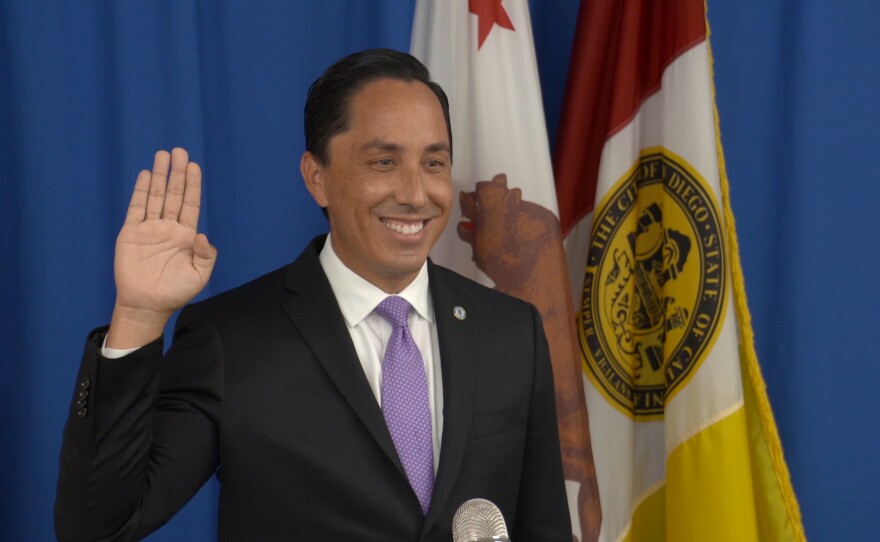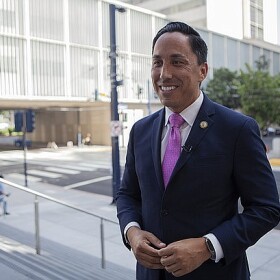San Diego Mayor Todd Gloria has been in office for barely a month, yet he’s already made decisions that are changing the city’s direction.
Some of the changes are about who Gloria is — he’s the city's first openly gay mayor and the first of Latino, Filipino or Native American descent.
But the biggest differences Gloria has brought to San Diego so far are directly related to his job running city government. As Gloria prepares to give the first State of the City address of his term Wednesday, here are three ways he has set himself apart from his predecessor.
Energy
The first major policy decision Gloria made as mayor was to reject an offer made by San Diego Gas & Electric to continue delivering energy to city homes and businesses.
The city currently charges SDG&E fees in exchange for allowing the utility to keep its gas and power lines on the public right-of-way. Those fees are baked into a 50-year-old contract, called a franchise agreement, that was due to expire this month before the City Council agreed to extend it through June 1.
For the past year, activists have been pushing city officials to strike a harder bargain with the utility while negotiating a new contract. And they felt Mayor Kevin Faulconer would be too willing to accept an offer made by the utility. Gloria wasted no time in rejecting the initial offer.
RELATED: San Diego Community Advocates Fight Proposed Energy Deal, Want City-Owned Utility
Rather than go along with the process Faulconer started, Gloria declared SDG&E's bid "unresponsive" to the city's terms. He's now preparing to set new terms for the utility that go further than what his predecessor wanted. Those terms could include more money for the city's general fund and stronger commitments to renewable energy.
"Rejecting the bid by SDG&E was an easy decision," Gloria said in an interview. "I'm trying to bring a different attitude and a different approach to City Hall. And that's one where we understand that we are the 8th largest city in the country, this franchise is worth billions of dollars, and we are going to negotiate aggressively on behalf of the people of this city."
As a Republican, Faulconer was unlikely to allow the city government to take over electricity and gas services through a process called municipalization. But Gloria said it's not off the table.
"The city has been served well by its utility partner over the last 100 years or so," Gloria said. "I believe we can come to an agreement that works well for everyone. But if we can't come to that, we'll have to make a different decision."
COVID-19
In California, responsibility for public health at the local level mainly falls on county governments. But in the city of San Diego, the mayor plays an important supportive role. In addition to being the most recognizable elected official that city residents listen to for information on the pandemic, the mayor also oversees the police, who are responsible for enforcing the county and state restrictions intended to curb the spread of the virus.
Faulconer was reluctant to legally punish businesses for violating the public health order. Many restaurants have been ignoring the state's ban on outdoor dining, which Faulconer said was unnecessary.
Gloria, however, supports the restrictions and on December 30 signed an executive order directing the San Diego Police Department and City Attorney's Office to cite and prosecute those scofflaw businesses.
"Going around the city and seeing most businesses complying with the public health order, and then observing a handful of others who are not, that doesn't seem fair," Gloria said. "As someone who is tasked with protecting and serving the people of this city, I believed it was necessary to start stepping up enforcement focused on egregious violators of the public health order."
Labor relations
Last week, a judge invalidated Proposition B, the 2012 ballot measure that denied defined-benefit pensions to all newly hired city employees except police officers. The ruling was expected as it followed a string of defeats in court for the measure's supporters.
In 2018 the state Supreme Court found that the city had violated state labor law when it placed Prop B on the ballot. The law requires cities to negotiate with unions representing their workers before cutting benefits. The justices found city officials — chief among them former Mayor Jerry Sanders — created Prop B as a citizen's initiative with the clear intent of evading that requirement to meet with the unions.
Faulconer was one of Prop B's original champions, dating back to when he was a city council member. And even as its invalidation became increasingly likely, Faulconer still fought to keep the measure in the City Charter.
Gloria, in contrast, opposed Prop. B when it was passed and praised the judge's decision last week as a validation of the nearly decade-long battle waged by city employee unions to have the measure invalidated.
"I think it brings us closer to closure on this issue that we have been dealing with for years — something that I have always opposed, even when it was unpopular," Gloria said.
There are still questions about how far Gloria's allyship with city employee unions will go. City officials are projecting several years of budget shortfalls as the pandemic decimates San Diego's tourism economy. That means future negotiations with public employee unions over salaries and benefits will not be getting any easier.









